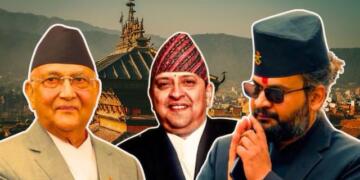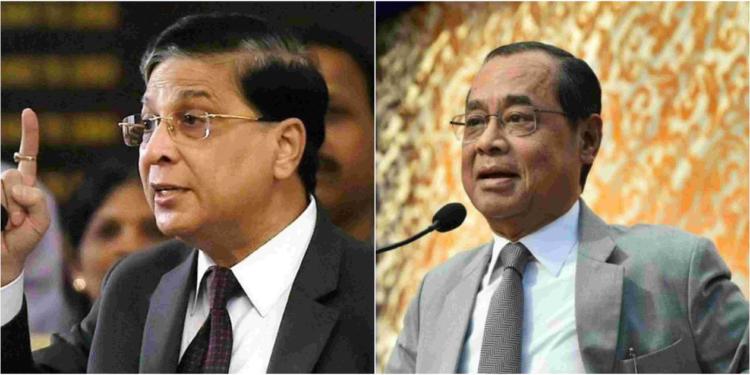Harish Salve, the erstwhile Solicitor General of India had ominously stated in 2014 that the opposition might use the court to destabilise the government. This prophecy has been gradually unfolding since the advent of Dipak Misra, the former Chief Justice of India. Thereafter, with his departure, the current CJI, Ranjan Gogoi, has become the latest prey. One can believe the darkest hour in a democracy to arrive when the judiciary is targeted.
In the past 5 years, there is a strange correlation between judgments deemed unfavorable to the opposition and the left-liberal nexus; and attacks on the judiciary. Precedence shows that whenever a judgment has been passed by the Supreme Court, which pertains to the right spectrum, whether it’s political or cultural, scathing attacks are aimed at the judicial institution. These attacks are aimed at influencing the decision, or if anything, delaying the process until a suitable circumstance. These tactics have undermined the independence of the judiciary in the country.
The entire saga of interfering in working of the Supreme Court by the PIL activists and opposition leaders started after the press conference by four sitting Supreme Court judges. The press conference gave the opening which a particular group was desperately waiting to obtain and ended up being a motion for impeachment.
The latest attack comes on CJI Ranjan Gogoi wherein it has been alleged that the esteemed judge has sexually harassing an employee of the Supreme Court. The employee was a former Court officer who worked as a junior assistant in the Supreme Court. As part of her role at the home office of the CJI, she had no direct interaction with him. In the affidavit the former employee sent to all the judges of the court on April 19, 2018, she has alleged that she was sexually harassed by Ranjan Gogoi on 11th Oct, 2018; thereafter which she was dismissed from the service.
In light of this, four leftist media publications, Leaflet, The Wire, Caravan and Scroll have ‘self righteously’ sought to unearth the allegations by blatantly questing the CJI. The secretary-general on the Chief Justice’s behalf sent a reply to the media houses denying all claims, stating that they are “completely and absolutely false and scurrilous and are totally denied”.
It is pertinent to note here that the accuser is a person who has 2 criminal cases pending against her. Moreover, the person does not have any substantial proof or evidence of her allegations. Months after the dismissal, she has come up with the story at a very ‘convenient’ time.
CJI Ranjan Gogoi on this emphasized that the judiciary of this country is under threat. “This is unbelievable. I should not stoop low even in denying it. A bank balance of Rs. 6 lakh 80 thousand is all I have as bank balance. They cannot catch me on money, so they have brought up this. This is the reward a CJI gets after 20 years and a bank balance of Rs. 6,80,000.” He also stated that the allegations leveled against him forms a “bigger issue”, he said, “Things have gone too far. Judiciary cannot be made a scapegoat.”
Exactly what the esteemed judge is implying by using terms such as “bigger issue” and “scapegoat” and stating that “they could not catch me on the money”, came to light with his subsequent statement. He said, “Considering the very, very important cases that are due to be heard next week, they want to destabilize the office of the CJI. Independence of judiciary is under a very, very serious threat. This is pathetic.”
Topping the list of the important cases to be heard next week is Rahul Gandhi’s case involving contempt of court. After the Supreme Court had admitted fresh documents in the Rafale review petition, Rahul Gandhi believed it to be ratification by the Supreme Court of his claims and unable to contain his excitement had stated, “The SC has made it clear that chowkidarji was involved in the theft”. This was a clear case of contempt of the court since the apex court had stated anything but that. On the basis of a criminal contempt petition filed by BJP MP Meenakshi Lekhi, the bench had asked for clarification on the matter stating, “We deem it proper to ask the respondent for his explanation which will be laid before us on or before 22.04.2019”.
Apart from the contempt case, the Supreme Court, in an effort to judicially deal with the issue of release of the Modi biopic, had ordered the EC to watch the full biopic and subsequently submit its decision on the ban by April 19th, 2019. Thereafter, the bench comprising of the CJI and Justices Deepak Gupta and Sanjiv Khanna was to consider the EC report and hear the matter on April 22nd.
It is quite ironic to observe the list of cases scheduled to be heard merely 2 days after the controversy, without any evidence has erupted. Perturbed by what CJI Ranjan Gogoi is facing, the attorney general, AG KK Venugopal couldn’t hold his silence anymore when he stated on this, “I am an officer of this Court, I was also under attack for defending the government”.
The outcome of the Rahul Gandhi contempt case and the Modi biopic may have repercussions on the election results; the repercussions being of such nature that the opposition may not want to deal with.
These unsubstantiated allegations against the judicial system in general and CJI Ranjan Gogoi, in particular, are nothing new. Erstwhile CJI, Dipak Misra faced a similar situation when a motion for his impeachment had been introduced in the Rajya Sabha by the opposition parties. The baseless motion did not pass. However, many observers saw the motion itself as pressure tactic against the CJI. The attacks on the CJI Dipak Misra by a certain section of “intellectuals” were a result of some landmark judgments by him. CJI Dipak Misra was heading the bench that rejected the plea to spare Yakub Memon and had also given the landmark judgment on playing the National Anthem in cinema halls. Moreover, he was the one who had dismissed the public interest petition regarding the death of CBI judge BH Loya and stated the death to be natural and such petitions to be an attack on the Judiciary. The opposition had been using the unfortunate death of Justice Loya to malign the image of Amit Shah which successfully came to an end after the judgment. He also ordered a special investigation team (SIT) to reopen 1984 anti-Sikh riots cases and investigate 186 cases related to it. But perhaps the biggest source of discord was the Ram Mandir case. CJI Dipak Misra had indicated he would fast-track the Ram Mandir case. This was highly against the personal interests of people championing for the Babri Masjid. Kapil Sibal, the lawyer representing the Sunni Waqf Board had pleaded before the court for the hearing to be put on hold till July 2019; which was slammed by the judge. Kapil Sibal probably wanted a favourable government to oversea the proceedings, thus, blatantly undermining the independence of the judiciary. Soon after, a motion of impeachment was introduced against the judge.
Observing from a neutral point of view, former CJI Dipak Misra had passed quite a few judgments from the leftist point of view as well, the biggest one being that of the Sabarimala, wherein the court had gone against the tradition of the worshippers and allowed women to enter the temple. Though the judgment received quite a backlash from the affected citizens and had gone against the current government’s stand, baseless accusations were not framed against Dipak Misra.
Be it Dipak Misra or Ranjan Gogoi, certain ploys are at play here to delay the judgment of the court. Cases of paramount political importance are being interfered with, in an effort to somehow influence the election results. Whether it is sheer co-incidence to see the commonality of the nature of the cases and the people involved in it, or an actual conspiracy; the fact remains that the functioning of one of the most independent and important institutions in the country is being interfered with, for personal political gains.



























